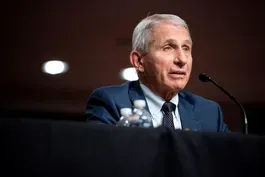
Millions face record-breaking temperatures amid heat wave
Clip: 6/19/2024 | 6mVideo has Closed Captions
Millions face record-breaking temperatures amid dangerous heat wave
Tens of millions of Americans are baking in a dangerous heat wave. The powerful heat dome is forecast to keep temperatures well above normal across much of the country through the weekend. Across the globe, hundreds died in Saudi Arabia where temperatures reached 125 degrees Fahrenheit in Mecca. Geoff Bennett discussed more with Jeff Goodell, author of "The Heat Will Kill You First."
Problems with Closed Captions? Closed Captioning Feedback
Problems with Closed Captions? Closed Captioning Feedback
Major corporate funding for the PBS News Hour is provided by BDO, BNSF, Consumer Cellular, American Cruise Lines, and Raymond James. Funding for the PBS NewsHour Weekend is provided by...

Millions face record-breaking temperatures amid heat wave
Clip: 6/19/2024 | 6mVideo has Closed Captions
Tens of millions of Americans are baking in a dangerous heat wave. The powerful heat dome is forecast to keep temperatures well above normal across much of the country through the weekend. Across the globe, hundreds died in Saudi Arabia where temperatures reached 125 degrees Fahrenheit in Mecca. Geoff Bennett discussed more with Jeff Goodell, author of "The Heat Will Kill You First."
Problems with Closed Captions? Closed Captioning Feedback
How to Watch PBS News Hour
PBS News Hour is available to stream on pbs.org and the free PBS App, available on iPhone, Apple TV, Android TV, Android smartphones, Amazon Fire TV, Amazon Fire Tablet, Roku, Samsung Smart TV, and Vizio.
Providing Support for PBS.org
Learn Moreabout PBS online sponsorshipAMNA NAWAZ: Welcome to the "NewsHour."
Tens of millions of Americans are baking in a dangerous early summer heat wave.
Dozens of cities from the Midwest to New England are expected to reach record highs, as the heat index hits triple digits.
The powerful heat dome is forecast to keep temperatures well above normal across much of the country through the weekend.
In the meantime, wildfires are raging across the West, fueled by soaring temperatures and dry conditions.
In New Mexico, two massive blazes forced thousands of evacuations and killed at least one person.
And a major fire north of Los Angeles remained less than 40 percent contained.
GEOFF BENNETT: Across the globe, authorities say hundreds died in Saudi Arabia, where temperatures reached 125 degrees at the Grand Mosque in Mecca this week.
More than a million people traveled to the country this week for the Hajj, the annual Islamic pilgrimage.
In Greece, a stifling heat wave was responsible for the deaths of multiple tourists, including a 55-year-old man from Floral Park, New York.
For more on the impact and implications of all this, we're joined by journalist Jeff Goodell.
He's author of the book "The Heat Will Kill You First: Life and Death on a Scorched Planet."
Welcome back to the program.
It's good to have you here.
JEFF GOODELL, Author, "The Heat Will Kill You First: Life and Death on a Scorched Planet": Good to be back.
GEOFF BENNETT: Some 75 million Americans are under an excessive heat warning or heat advisory today.
Some of these warnings are the first ever issued in places like New Hampshire and Maine.
How unusual is this heat wave that we're seeing right now and how much of it is driven by climate change?
JEFF GOODELL: Well, that's a really good and important question.
Obviously, heat waves are nothing new.
But what else is not new is that scientists have known for more than 100 years that adding CO2 to the atmosphere by the burning of fossil fuels primarily is warming up our planet.
2023 was the hottest year on human record.
Ten of the last hottest years have been in the last decade.
So what we're seeing today is completely consistent with what science tells us.
We're seeing longer heat waves.
We're seeing more extreme heat waves.
We're seeing them starting earlier in the year.
And we're seeing them in unusual places that we haven't seen before.
GEOFF BENNETT: I know, from having read your book, that extreme heat is the deadliest form of severe weather.
What are the particular dangers of a drawn-out heat wave like this?
And who's the most affected?
JEFF GOODELL: Well, our bodies are like these heat machines.
We have this kind of unconscious mechanism in our bodies that keeps our bodies at a very stable temperature.
I think everyone knows that.
When you go to the doctor, the first thing the doctor does is take your temperature.
It's a sign that things are wrong.
And so what happens during these extreme heat events is that our body has to work much harder to maintain that temperature.
And so what happens is, your heart starts pounding and starts pushing more blood towards the surface of your skin, where it can be cooled through sweating.
And that can work for a while.
But if the temperatures get too high, it really puts your life at risk.
Not everybody is equally vulnerable.
People who are older, people who have weak hearts, young children, pregnant women, people who are on certain kinds of medications, their bodies can't regulate the temperature.
And once your body starts warming up, it's really not pretty what happens.
GEOFF BENNETT: It raises the question of what to do about all of this.
And earlier this week, a coalition of labor and environmental groups filed a petition to urge FEMA to include extreme heat and wildfire smoke in their definition of major disasters.
How might that help?
And what are the challenges to that approach, logistical and otherwise?
JEFF GOODELL: Yes, that's an important question too.
I mean, FEMA has been focused on major disasters that impact infrastructure where federal money is needed to, say, rebuild power lines and provide housing for people whose homes have been destroyed in hurricanes and other events like that.
Heat waves are entirely different.
Heat waves are events that really don't do a lot of damage to infrastructure, but do a lot of damage to human beings.
And so they are really potentially mass mortality events.
And FEMA is in the process of reevaluating how it defines a major disaster.
And it's not just FEMA, I should say.
The federal government is sort of behind on thinking about how they deal with extreme heat in other cases also.
The OSHA, the Occupational Safety and Health Administration, has been working for seven years or so on federal heat standards.
It still hasn't been able to come up with it.
So the government is really behind on understanding and dealing with these extreme heat events.
GEOFF BENNETT: In the meantime, the world is getting hotter.
That is clear from all of the data.
What does life on a much hotter planet look like, Jeff?
(LAUGHTER) JEFF GOODELL: Well, I live in Austin, Texas.
I can tell you very well what life on a much hotter planet looks like.
We had 40 days above 105 degrees last summer, and it's looking like that again.
You live a vampire life.
You stay inside during the day if you're lucky enough to have air conditioning.
You go out in the morning, you go out in the evening.
The -- this is manageable to a certain level.
But as this heat increases hotter and hotter, more -- the risks to vulnerable people gets greater and greater.
I call heat a predatory force in my book.
It really does go after the most vulnerable people first.
And so we're going to see more and more suffering and more and more loss as these temperatures climb.
GEOFF BENNETT: That is journalist and author Jeff Goodell.
Thanks so much for your insights.
JEFF GOODELL: Thanks for having me.
Fauci on his relationship with Trump during the pandemic
Video has Closed Captions
Fauci on his fraught relationship with Trump and the attacks he has faced (7m 55s)
The legacy of Willie Mays on and off the baseball field
Video has Closed Captions
The legacy of Willie Mays on and off the baseball field (9m 39s)
Putin's North Korea pact could land weapons for Ukraine war
Video has Closed Captions
Putin signs pact with North Korea that could increase weapons for Russia's war in Ukraine (8m 5s)
Report shows formerly enslaved people were ousted from land
Video has Closed Captions
Report reveals how formerly enslaved people were ousted from land received after Civil War (6m 33s)
What primary results say about the state of the GOP in 2024
Video has Closed Captions
What the latest primary election results say about the state of the GOP in 2024 (6m 11s)
Providing Support for PBS.org
Learn Moreabout PBS online sponsorshipSupport for PBS provided by:
Major corporate funding for the PBS News Hour is provided by BDO, BNSF, Consumer Cellular, American Cruise Lines, and Raymond James. Funding for the PBS NewsHour Weekend is provided by...
















